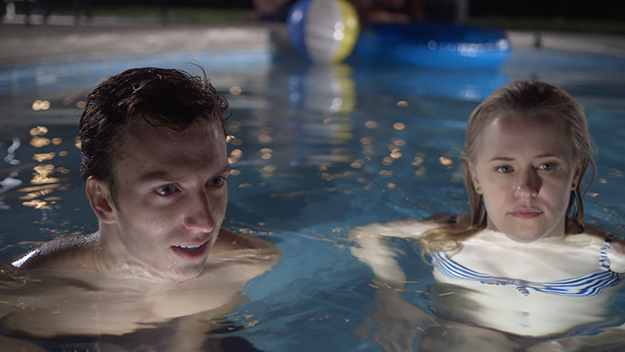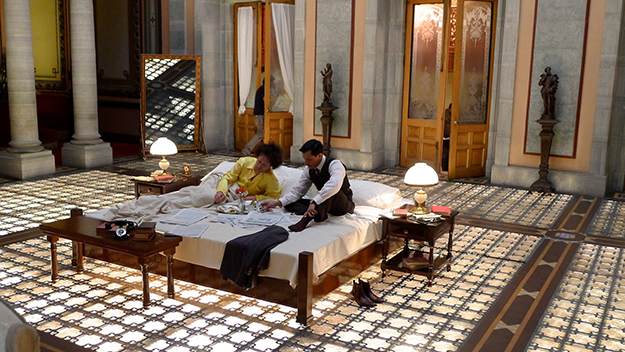While it would be foolhardy (even counterproductive) to expect a LGBT film festival to manufacture a sense of we’re-all-in-this-together harmony, the stand-out films at this year’s NewFest nevertheless showcase what art can bring to a disparate-yet-connected group of people: the complication of set assumptions; the expansion of intellectual and emotional possibilities; the richness of experience as filtered through the camera’s gaze. These movies do not offer a solution to the hard questions of contemporary queer existence so much as encourage those within it to approach said issues with revitalized eyes and an empathetic heart.
We Came to Sweat: The Legend of Starlite Both I Always Said Yes: The Many Lives of Wakefield Poole and We Came to Sweat: The Legend of Starlite continue the long tradition of LGBT documentaries that preserve individuals and institutions vital to queer history that might otherwise be blown away by the winds of time. As the title implies, I Always Said Yes chronicles the multitude of professional and personal parts played by the eponymous filmmaker, whose most famous works are the Seventies erotic classics Boys in the Sand (71) and Bijou (72). We Came to Sweat, meanwhile, details the history of a pre-Stonewall LGBT establishment—the Starlite Lounge in Brooklyn, a haven for the borough’s black gay community since its opening in 1959 that became threatened with eviction in 2010. Neither film offers a particularly striking departure from the documentary traditions within which they operate. We Came to Sweat chiefly relies upon fly-on-the-wall footage of community meetings and barroom conversations to chart the efforts to negotiate for the Starlite’s continued existence, while I Always Said Yes operates safely within the template of talking-head interviews and archival footage. Their value comes from the simple fact that someone decided to point a camera at people and places that matter and will not be around forever. The aging Poole proves a feisty and unabashedly emotional guide to his own creative highs and private lows, acknowledging the wayward nature of his career path without a trace of self-pity. Denizens of the Starlite also get their moments in the cinematic sun, sharing their memories and savoring the ineffable pleasures of their beloved gathering place as the possibility of its erasure looms perilously close. This is cinema as archive—an impulse that remains essential even in the era where sophisticated documentary/fiction hybrids and self-reflective non-fiction practice gains much of the spotlight.
Lyle An unapologetic piece of genre red meat, Lyle offers a queer spin on the Rosemary’s Baby school of maternal horror. Gaby Hoffmann plays Leah, a homemaker with a young daughter and another child on the way. The film opens with her and partner June (Ingrid Jungermann) moving into a spacious old apartment that has a foreboding history of child deaths. It would be unfair to give much away regarding Lyle’s plot, though part of the pleasure comes from writer-director Stewart Thorndike’s bald-faced engagement with the conventions and clichés of the domestic freakout out film (from Repulsion and The Exorcist to Joshua and Grace). They’re all here—shadowy hallways and creaky doors; unnerving neighbors; an increasingly suspicious spouse—and Thorndike works them with the gleeful proficiency of a true horror aficionado. What elevates Lyle above giddy pastiche, though, is its unnerving refusal to tip its hand regarding whether Leah’s increasing fears for the safety of herself and her unborn child reflect the delusions of a lonely and grief-struck individual or a sinister conspiracy touched by the paranormal. Hoffman walks the line between embattled and unhinged with unwavering commitment. If it’s perhaps open to question whether Lyle engages as provocatively as it could have with the intrinsically queer elements of its narrative (the question of whether the film would be different with a heterosexual couple crossed my mind once or twice), Hoffman’s ferocity grounds you in the specificity of Leah’s terrors enough that such hypotheticals cannot negate the chill that Lyle’s feverish climax leaves in your heart.
The Foxy Merkins The specificity of lesbian desire comes explicitly to the fore in The Foxy Merkins, even as it’s reflected through the funhouse mirror of observational farce. A NewFest alum whose delightful debut feature, Codependent Lesbian Space Alien Seeks Same, was screened in 2011, Madeleine Olnek directed and co-wrote (with stars Lisa Haas and Jackie Monahan) this comic buddy movie about New York lesbian prostitutes Jo (Monahan), a seasoned pro who insists upon her own fundamental heterosexuality, and Margaret (Haas), a newcomer in search of her long-lost mother. Olnek tracks the pair through a series of comic set-pieces at once deadpan and slightly surreal, from a client’s insistence on paying Margaret with a Talbot department-store gift card (whose status as an unlikely pick-up spot becomes a running gag) to the appearance of a motor-mouthed merchant (Alex Karpovsky) in an outer-borough cemetery hawking the titular hair pieces. Unlike Codependent’s breezy spoofing of 1950s B-grade sci-fi, The Foxy Merkins mines humor from the experiences of what are essentially homeless sex workers—a balancing act between wry satire and empathy that Olnek occasionally fails to maintain. (Her decision to include to-the-camera “interviews” with other prostitutes adds to the sporadic queasiness of whether the film glosses over some less-than-amusing realities for the sake of dry visual gags.) But Olnek has an ace up her sleeve. Just as Codependent’s true subject was not cinematic satire but the compromises of romantic love, The Foxy Merkins ends up being a sharp-eyed study in the vicissitudes of female friendship, particularly between lesbians and straight women. The transient nature of Margaret and Jo’s adventures together leads to a poignant conclusion regarding the possibilities and limits of their bond, affectingly underscored by perhaps the best film-ending music cue I’ve seen of any NewFest movie this year.
Blackbird Melodrama forms the heart of Patrik-Ian Polk’s Blackbird, and I mean that in the best way possible. This chronicle of Randy (Julian Walker), a black gay teenager coming of age in a small Southern Baptist town, is practically bursting with plot points, including (but not limited to) missing children, broken families, secret romances, surprise pregnancies, tragic deaths, a last-minute reunion, and tearful confessions. It’s not exactly the rhythms of life that are captured by Blackbird’s narrative plentitude. Even at its best, you can feel the plot gears turning. What it offers instead are the pleasures of big-hearted and fearless investment in expressing as many emotions, experiences, and events as one can fit within a 102-minute running time. Polk’s sense of generosity and willingness to expand his universe evermore pushes the viewer through rough patches of clunky exposition and overly pat character arcs—never more so than in an audacious climatic dream sequence that outlines the varied fates of Randy and his close-knit coterie of high-school friends and college-aged boyfriend. That such gambits pay off reflects not only Polk’s own adventurousness but the trust he puts in his cast (which includes Mo’Nique and Isaiah Washington as Randy’s separated parents), who all deliver nuanced and fiercely empathetic performances.
The Third One Finally, two films tackle the complexities of queer male sexual and emotional bonds with equal degrees of erotic frankness, but in the service of quite distinct visions. The Third One offers a beguilingly straightforward take on an online threesome, in which a thirty-something couple (Carlos Echevarría and Nicolás Armengol) chat up the fresh-faced Fede (Emiliano Dionisi) and eventually invite him over for dinner and to spend the night. Though writer-director Rodrigo Guerrero begins the film with an extended series of webcam images and floating text-message boxes, he shoots the majority of the film with well-modulated long takes and fills the soundtrack with reams of flowing naturalistic dialogue. And when the film (ahem) climaxes with the long-awaited three-way, he frames it as a spontaneous and joyful union of bodies. The Third One acknowledges the emotional vulnerabilities and interpersonal frictions that allow all three to agree to their evening together, but the film’s ultimate vision of polyamorous connection is an unabashedly optimistic one. Julián Hernández’s I Am Happiness on Earth shares The Third One’s interest in the explicit depiction of queer sex in various configurations, including a lengthy mid-film-within-a-film segment chronicling a bisexual threesome that’s as much dance as it is copulation. That sequence is framed as part of the larger erotic opus of Emiliano, a smoldering filmmaker whose idealized visions of sensual union form a counterpoint to the cavalier way in which he treats his young lovers: first, a love-struck dancer; and later, a smitten rent boy. Hernández critiques Emiliano’s fetishization of erotic imagery via the camera while simultaneously capturing the film’s copious sex scenes with gorgeous chiaroscuro lighting schemes and sensuous tracking shots. (A knowing bit of self-awareness has Hernández opening the film with a luxuriant circular track around a dancer, followed a few scenes later with Emiliano using exactly the same camera move to film another dancer.) I Am Happiness on Earth finds beauty in the queer erotic image even as it remains suspicious of how said imagery can provide a fleeting substitute for the realities of sexual connection—a paradox that Hernández’s deceptively simple narrative leaves for the viewer to untangle. NewFest runs July 24 to 29 at the Film Society of Lincoln Center.





title: “Festivals Newfest” ShowToc: true date: “2024-04-25” author: “Darrell Weathersby”
Henry Gamble’s Birthday Party After the Obergefell v. Hodges Supreme Court decision in June, the American LGBT community found itself celebrating a decades-long battle to ratify its right to marriage. Images of happy couples across the nation were splashed across national newspapers and online media alike. The “Love Is Love” campaign had triumphed after all. But even as engaged couples began to file the necessary paperwork and newlyweds were being feted by friends and family, those at the fringes of the gay community began to loudly ask its self-appointed leaders to take stances on issues that had long been shelved in the pursuit of marriage equality: trans rights, workplace discrimination, immigration reform. Most of these require careful examinations of difference, deflating the humanist rhetoric that had become the greatest asset in the community’s quest for change. After all that, how could a political campaign now be waged in the name of fluid and ever-shifting identities that defy and push back against the kind of narratives of sex, gender, love, and nation that had proven so effective? Against the backdrop of this moment, it’s no surprise that so many entries in NewFest, New York City’s premier LGBT film festival, center on young protagonists whose stories stage complex interventions into questions of queer identity. They leave behind the simple notion of a politically effective label (“gay,” “lesbian”) and probe instead the very ambiguity inherent in queer sexuality, without resorting to the most well-worn narrative template of gay cinema (the coming-out story) or to ahistorical celebrations of the gay experience. In the festival’s stand-out films, sexual exploration and personal introspection are not oriented toward the closet door. Instead, they thrust characters and narratives into the at times difficult, at times exhilarating reality of being a member of the LGBT community.
Eisenstein in Guanajuato Peter Greenaway’s Eisenstein in Guanajuato, the festival’s opening selection, is a brazenly flamboyant look at the Soviet master’s sojourn down south (and east) in the Thirties to attempt ¡Que viva México!, a film about that country’s storied history. Greenaway, though, is as uninterested in that film project as his Eisenstein (Elmer Bäck), who prefers to lounge in bed with his Mexican companion, Palomino Cañedo (Luis Alberti). While the film — like Sergei — would readily spend its duration in Guanajuato merely indulging in lustful excesses, Greenaway does offer some history behind the troubled Mexico production, which included an embattled relationship with producers Upton and Mary Sinclair, who commandeered all of Eisenstein footage in an attempt to get him to finish his project, and eventually, an immigration lawsuit (courtesy of Eisenstein’s now infamous and pornographic drawings) which forced the director out of the country and away from his Palomino “stud.” Part homage and part queer revisionist history, his film puts Eisenstein’s alleged homosexuality front and center, surely motivating many of Greenaway’s exuberant stylistic flourishes, which feel like sensuous refractions of the groundbreaking techniques in Battleship Potemkin and Strike. Matched by a script that gives Bäck endless monologues about Eisenstein’s body, his politics, and his visions of Mexico, Eisenstein in Guanajuato argues that the vibrancy of the Spanish-speaking country awakened the director’s libidinal side, his debauchery culminating in an explicit sexual encounter between the two men involving olive oil which brings Eisenstein (quite literally) to his hands and knees. It’s a fitting opening title for the festival, loudly and proudly wearing its queerness on its sleeves. “How big is yours?” The opening lines of Stephen Cone’s Henry Gamble’s Birthday Party are designed to subvert the seemingly straightforward scenario suggested by its title. They’re delivered to the camera, which is positioned as if we were sharing a bed with the young, shirtless, blond, freckled Henry (Cole Dolman), and makes the moment even more jarring. Henry is addressing Gabe, his best (straight) friend from school, and in Dolman’s eyes, you already see this pastor’s son and active member of his church youth group struggling with his sexual longing. Cone’s script, which could easily have made Henry’s homosexuality the Chekhov gun of the piece, is interested instead in staging a number of conversations about sexuality within the Christian faith—a timely issue given the media circus surrounding Kim Davis, the Rowan County clerk who has become a symbol for ill-conceived notions of religious liberty rights. Henry’s sun-dappled and indie-music scored pool party is host to a series of interlocking plots including an extramarital affair, a nervous breakdown, and a high-school tryst, that all address, with varying degrees of success, the issue of sexual repression within a faith-driven community. Much of the didacticism of the film is attenuated by Cone’s strong ensemble who work hard at fleshing out these stories and imbuing their characters with a humanity that makes them feel more than mere ideological mouthpieces. Naz and Maalik Two genuinely simple yet no less engrossing stories about young love were Alanté Kavaïté’s The Summer of Sangailė and Jay Dockendorf’s Naz and Maalik. Kavaïté, who won the directing award in the dramatic world cinema category at Sundance in January, shoots the summer romance between Sangailė and Auste, two teenagers in a small town with remarkable sensuality. The Lithuanian seaside where the film is set frames Sangailė’s blossoming from sullen teenager to luscious lover and later, after a well-placed time-jump, a fearless stunt pilot, imbuing her lesbian romance with liberating and therapeutic consequences (she suffers from vertigo). The plot may well be well-trodden but Kavaïté succeeds in representing the throes of young sexual desire as essential fuel for artistic inspiration—Auste is a fashion designer and photographer who pushes Sangailė to face her fears both physical and emotional. Dockendorf’s unassuming two-hander is a portrait of what it means to be gay, black, and Muslim in contemporary New York City. As the young boys of the title walk the streets trying to sell lottery tickets for extra income, discuss the merits of altruism, and try to make sense of their budding physical attraction, the film relentlessly dispels any pretense to privacy these young boys may feel they have. Every moment of shared public intimacy is irrevocably (and unfortunately) tied up with larger political and cultural implications. A walk down an alley for a furtive embrace fuels the baseless suspicions of an NYPD cop. A stolen kiss on the subway raises a devout sister’s alarm. Grounded in the naturalism of his two leads (Kerwin Johnson Jr. and Curtiss Cook Jr.), Naz and Maalik is a tender love story set against a post-9/11 culture of surveillance, reminding us that the high-profile gains in the courts that make great headlines still do not accurately represent the entire gamut of the queer experience day to day. And finally, the festival’s closing film, Alexandra-Therese Keining’s Girls Lost (Pojkarna in the original Swedish, which translates as “The Boys”), presents a sophisticated take on gender variance in the wrappings of a teen supernatural drama. At the heart of the film is a fairy tale: once upon a time there were three girls living near the edge of the woods who found a magical black flower that could transform them into boys for the night. Set in a contemporary Swedish village where these outcast girls suffer taunts from immature boys who sense their own discomfort at the girls’ closeness and potentially lesbian identities, Girls Lost uses its supernatural premise to literalize the fluidity of gender and sexuality. Keining’s sleek visuals and a radio-ready soundtrack make this Grimm-like premise play like a gut-wrenching thriller when one of the girls begins losing herself in her male alter-ego. Posing as a boy from out of town, Kim (played by Tuva Jagell as a girl, and Emrik Öhlander as a boy) begins a flirtatious friendship with Tony, only to be called out by her (girl)friend Momo, who boldly asks her: “Are you in love with him or do you just want to be him?” Kim cannot bring herself to answer for fear of what her response might say about her. Keining offers no tidy resolution for her protagonist. Instead, the ambivalent ending, which turns Kim into an outcast hoping to escape from her own body, makes the very first words we see on screen at the start of the film read not only like a promise but a warning: “If you’re blind to what is different, this story is not for you.” Which may very well function as a description of NewFest’s 2015 offerings. NewFest runs October 22 to 27 at the Chelsea Bow Tie Cinemas in New York.


